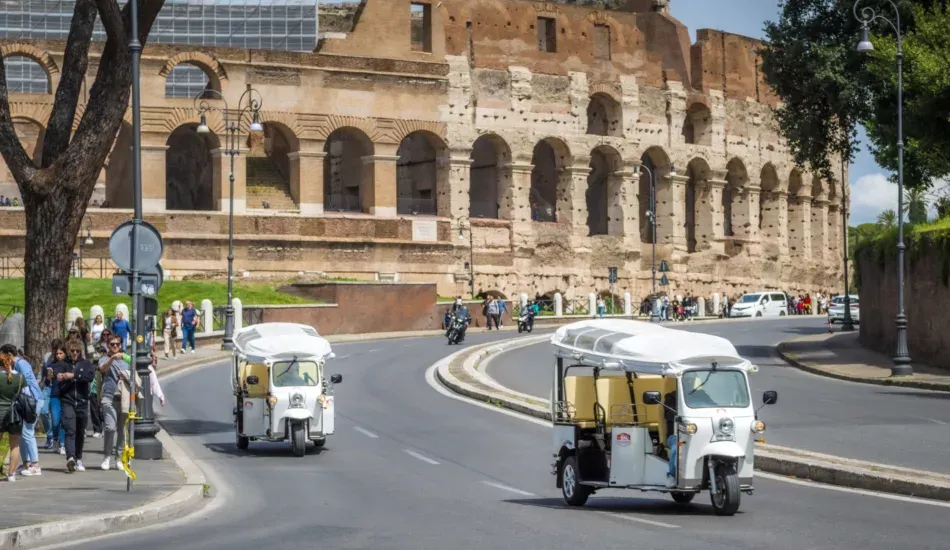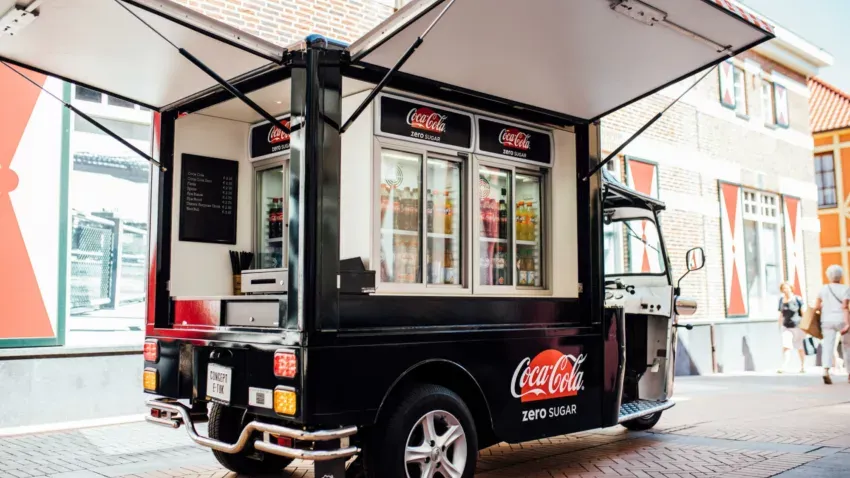The idea of E-Tuk Factory came from students at Delft University of Technology. They saw hundreds of polluting tuktuks on the roads in Bangkok and thought: this has to change. They put electric three-wheelers on the market. It turned out to be a worldwide hit. They are already driving around in Asia, America and Europe.

E-Tuk Factory's tricycles drive around various world cities. | Credit: E-Tuk Factory
The first electric tuktuk was designed for the tourist market, says CEO of E-Tuk Factory Jeroen Bulk. "In Asian countries such as Thailand and Cambodia, many tuktuks fulfill the role of cabs. Tourists eagerly use them. In addition, many cab vans drive around for locals. The means of transportation are only old and run on fossil fuels. This causes a lot of air pollution, especially in big cities like Bangkok."
Electric
The Utrecht-based company designed the E-Tuk: an electric tuktuk. This variant emits no polluting exhaust fumes. With one battery charge, 100 to 130 kilometers can be driven, depending on conditions. The E-Tuk Factory vehicle saves about 3.5 tons of CO2 annually.
Covid
Business was good, Bulk says. "There turned out to be a lot of demand for the E-Tuks. We found buyers in Asia and Europe. The orders poured in. Soon our three-wheelers were riding around in world cities such as Lisbon and Madrid."
Then came Covid. "Tourism collapsed and the requests stalled. The realization dawned that we did depend very much on tourism. That makes the company vulnerable. In addition, tourism in Europe is seasonal. In the winter months we don't do as well. That's why we consciously work in different regions. In Asia, we deliver all year round. Recently we also started doing distribution in America. That is a huge market and areas like California and Florida have a subtropical climate. So we are less dependent on the seasons."
Retail
.To lean less on tourism, the Utrecht start-up will soon launch the SmarTuk. That's an E-Tuk aimed at retail. "It is intended for goods transport within cities - the last mile delivery," he explains. "The design of the tuktuks is modular. That means the lower frame is always the same. On top of that, different builds are possible. We have the pickup, which consists of an open body and is suitable for landscapers, for example. The cargo is a large, enclosed box and is ideal for package delivery. Yet another type of E-Tuk can serve as a food truck."

The SmarTuk is suitable for street vending, among other things. | Credit: E-Tuk Factory
Postal of Portugal and 7-Eleven
.The SmarTuks have already been tested by CTT, the national postal company of Portugal. Asian retail chain 7-Eleven also already drove the design. Bulk: "The reactions are positive. People are very satisfied with the ride comfort and stability. A tricycle is often associated with wobbly, but our E-Tuks are very sturdy. The battery life also proves to be more than sufficient in practice. The feedback we collected led to the final adjustments. The design is now final and the first orders are already in. Early next year we want to start delivering the SmarTuks."
He also sees opportunities in the Netherlands. "With the introduction of zero-emission zones, our product is also becoming increasingly relevant here. Diesel buses will soon be banned from entering the city. The market is big enough to be successful. Another advantage is that the SmarTuk only requires a moped license. So drivers without a car license may also drive it."
Production
.In the Netherlands, E-Tuk Factory has a development center. The actual production of all types of tuktuks takes place in Portugal and Thailand. "Because that's where most of our customers are. So it's a logical choice. The factory in Portugal serves the Southern European market and the location in Thailand serves the Asian market. To America we send the chassis plus body parts, after which the E-Tuk is finished on location. If we were to send the vehicles to America completely finished, we would also transport a lot of air. That's unnecessarily expensive and also not beneficial to the environment, so we'd rather not do that."
Battery
.The company also takes charge of battery development and production. "We want to own the heart of the vehicle. By the way, it's not just the battery. Around it is another whole system. That combination allows us to watch remotely and intervene if necessary. If a battery is not charging, we can reprogram it remotely. The system also contains a wealth of data, such as charging speed, battery life or weight transported. That data helps the end user set up operations as efficiently as possible."
Some thought is also being given to how batteries can be given a second life in the future. "In seven years, it is expected that the first batteries in our vehicles will have to be replaced. These batteries will then no longer be suitable for daily charging. They will no longer be useful for E-Tuks at that time, but for long-term storage the batteries may still be of value. We are investigating where and how our batteries can find a place again soon."
Investment round
.In order to deliver all electric tuktuks next year, production is being scaled up considerably. This requires capital. To raise the required money, E-Tuk Factory has started a sharefunding campaign through Invesdor. The target amount is 2 million euros. "We know the demand for our product is there. Now we want to scale up. Where previously we were building up to three hundred vehicles a year, soon it will be up to three hundred a month."
Source: change.inc